On The Record with Bret Bonanni: The Olympian Who Got Away
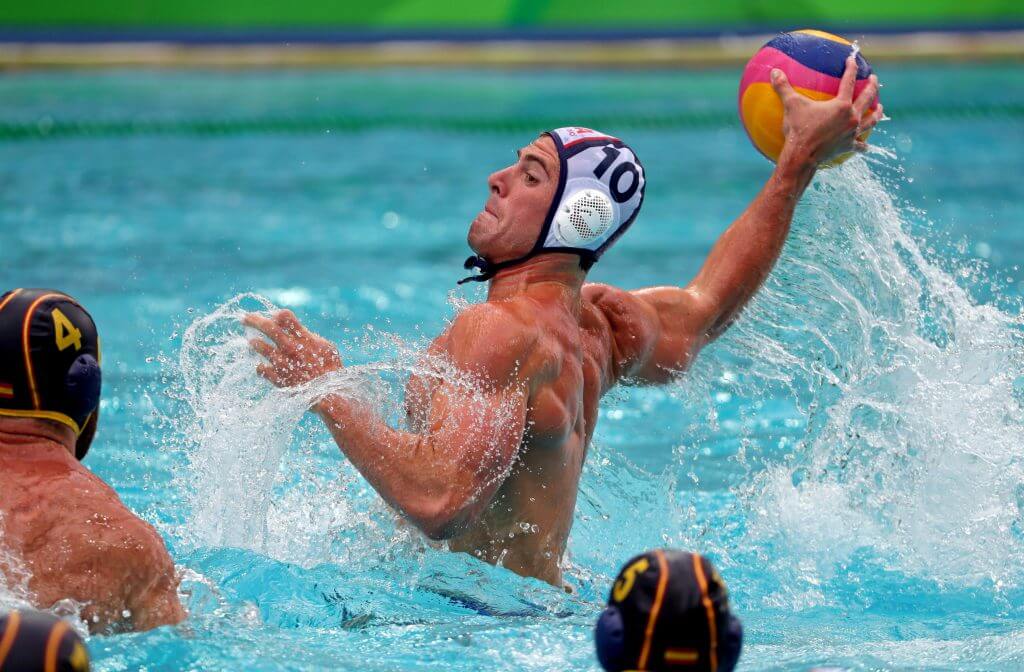
Now that the U.S. men’s senior water polo team has qualified for the 2020 Olympics, losing Bret Bonanni from the roster might not seem so devastating. But the absence of a player of Bonanni’s ability during Team USA’s current qualification cycle should not be understated. The leading scorer in Stanford polo history—with 360 career goals, he topped Tony Azevedo’s total of 332—Bonanni delivered a team-leading eight goals for the U.S. in the 2016 Rio Olympics.
Just 22 at the time, it seemed reasonable to assume that Bonanni would be one of the brightest of a young crop of players representing America in multiple Olympics.
And then, he walked away.
But, Bonanni didn’t give up polo entirely; he still competes with the New York Athletic Club’s (NYAC) master’s team and is active in polo camps on the West Coast. Earlier this year Swimming World spoke with him about his current work with Bonanni Development—a family-owned firm started by his father Ed in Huntington Beach, California—his love of polo and the difficult decision to leave Team USA when they needed him most.
– You grew up in perhaps the most fertile areas for polo in the world.
I’m born and raised in Huntington Beach and started playing water polo a little later [than most]. It wasn’t really on my radar until the summer going into eighth grade year. My brother Cole started playing as a freshman in high school.
I was in the sixth grade when he started and didn’t have any interest in playing. To me it was just something that my brother did. [He] was a huge influence on why I started playing polo. He was a goalie so we had a little cage in our backyard.
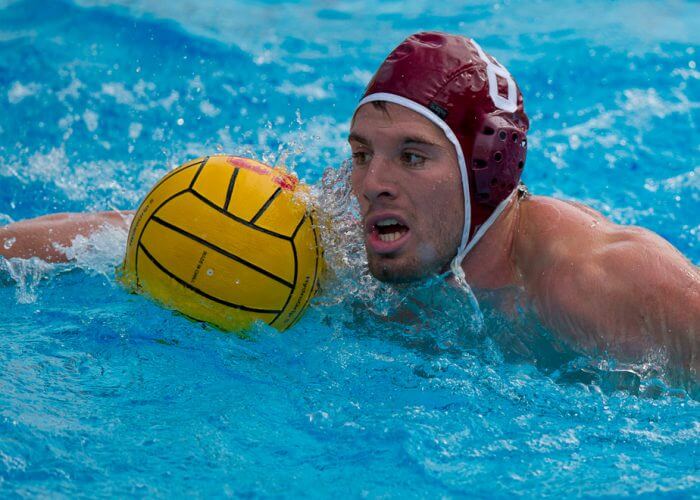
Brett Bonanni at Stanford. Photo Courtesy: Frank Chen
I was on the baseball and basketball teams so I was basically playing the main sports. I wasn’t into wearing a Speedo. I didn’t understand [the game], I thought there were too many whistles.
Whenever you get a chance to score on your big brother it’s cool. I would shoot the ball at him for hours and he would block the ball or I would score and we would just play games like that. It turned me into giving water polo a shot.
It took me a couple years to kind of loosen up to it [when] I thought: Hey, maybe it could be something cool to try in the summer.
I was taking a break from travel basketball at the time. I liked the physicality and intensity of it. That captivated me early on. [Polo is] one of the few sports where if someone does something that rubs you the wrong way—if you do it smart you can retaliate and not get a technical foul or an ejection from a game.
– Things came together when you got to high school.
Once I started playing polo I thought: “Great. Water polo’s in the fall, basketball is … I can pick up basketball right when the season’s over and then soon I can roll into that season. When summer rolls around get back into water polo.”
Once you get to high school you realize that’s a super naïve way of thinking—there’s no way that you’ll be able to really give 100% [to multiple sports].
Both baseball or football are on land, they involve running or whatever, but when it’s water polo … my cardio would be good for swimming but it didn’t translate to running and then running doesn’t really translate well to swimming.
I realized that early on and luckily found success my freshman year with water polo. I was fortunate enough to earn a spot on the varsity team. We ended up winning CIF [2008] that year. From that point on the coach said: “You’re going to be playing polo and that’s that.”
– The high school that you picked, Mater Dei, may have been the best place in the country for high school polo.
It’s important to understand that when I was in eighth grade, Mater Dei water polo, [wasn’t] a power house. Obviously, they had [enjoyed] success, but the main reason I went there is I went to a private Catholic school from Kindergarten through eighth grade and it was the natural transition.
So, the majority of my elementary and middle school went there. I had pretty much the same uniform that I wore in the eighth grade that I wore my freshman year.
– Maybe it was coincidence that you ended up at the right place at the right time. That, and playing for Chris Segesman, the Monarch coach, who now works for your father’s company.
It is an interesting deal we’ve got going on. But he’s always been like another father to me throughout college and he’s such a professional, whether it’s business-related, coaching-related or anything. He attacks it full on, 100%, and to anyone he’s an asset no matter what kind of chair you put him in.
[Interview with Chris Segesman the former Head Boys and Girls Coach at Mater Dei HS]
I floated the idea and we talked about it from a business standpoint. He decided to take that leap and it’s been awesome. He’s a great guy you want to have on your team.
– After Mater Dei you go to Stanford, one of the finest educational institutions in the country and you’re a star for Cardinal water polo.
For me, I would say no just from the sense that I couldn’t get a title, unlike Tony. He got a couple championships out of it and I didn’t get any. So, that still colors my time at Stanford.
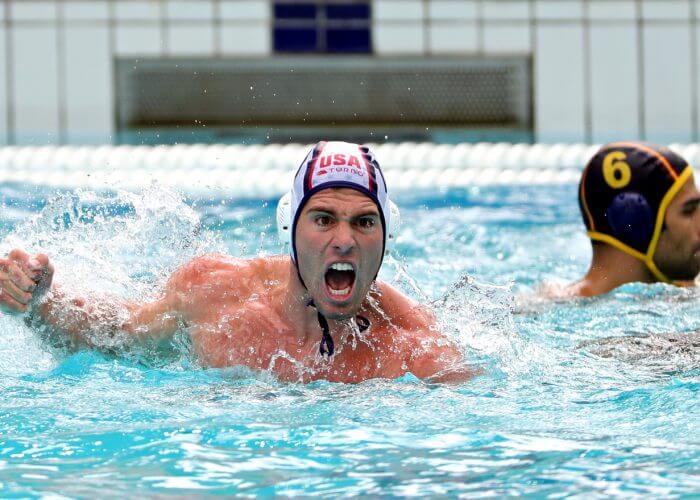
Photo Courtesy: Jeffrey Swinger-USA TODAY Sports
Academics are super important, and that was another great aspect of Stanford. Really enjoyed my classroom time there. But from a polo standpoint one thing I would say that I failed at—which anyone who plays collegiate polo would say—is, it doesn’t matter how many goals [you] score, if it’s not enough if you don’t get a championship.
Am I glad that I was able to produce and sneak a few goals in there? Yeah, absolutely. But would I trade it all for a championship? 100% without a doubt.
– In 2014 you start playing for Dejan Udovicic, a new coach, to get ready for the Rio Olympics.
Going to the Olympics was always a huge dream of mine—especially with a sport like water polo. There’s no NBA or MLB or World Series. It all comes down to the Olympics and competing for a medal. But it wasn’t easy. The traveling’s hard. The training’s hard. The hours are hard.
What was a huge contributing factor in me getting through it was a very, very strong support base from my family. I was fortunate enough that training was based out of SoCal for the most part. When I flew down to training I was able to stay at my home. You know, it’s not like I was having to couch surf or do anything I saw my teammates were doing.
But it’s tough when you go to school all week and you go to practice with your college teams, then the weekend comes and you’re hopping on a flight, doing all your homework on the flight, going to training that night, and then going back to training Saturday, Sunday just to fly back for class on Monday.
Between schooling, the college water polo team demands, the national team demands and trying to make it all work was a lot. But you have to kind of ask yourself if the juice is worth the squeeze and for me it was. It was a dream of mine and I wasn’t going to let anything stop me from getting to that point.
– Ben Hallock red-shirted at Stanford for his Olympic year, and Maggie Steffens also red-shirted. At a place like Stanford you’ve got to earn it.
There’s a lot of other amazing people out there that for lack of a better word, they don’t really care what you’re doing. You know? It’s just, “Hey, you’re in this class. Do you want to be in this class? If you want to be in this class, this is the standard you have to hold and if you’re not going to hold it then don’t take my class.”
But that’s the reason you go to a school like that. They take their job so seriously that they don’t expect to give any less effort than they’re giving.
– Which is the same standard that it takes to qualify for the Olympics.
It takes a whole lot of commitment in every sense of the word. It’s a lot of people’s dream and there’s a lot of talent out there and you have to really weigh out the risk-reward. If it’s that important to you, you’ll figure out anything and everything you need to do to make it happen.
You’re trying to make ends meet and justify this investment—and the payoff is that you get up there and when you play you’re wearing your country’s colors.
Once you get there, anything could happen. The only thing you can do is set yourself up the best way possible to achieve the ultimate goal, which is to come home with some hardware. Unfortunately, we weren’t able to get that done. But when you’re training and leading up to it, you only have one kind of focus in mind and that’s bringing home the hardware at the end.
– A key figure on that 2016 team was Azevedo, who’s made tremendous sacrifices to play polo.
Without a doubt. I mean, there’s no denying what he’s done. He’s the definition of an icon for us, being water polo players in the States and—having gone through it—the amount of respect I have for him is even greater. Because I understand everything he went through and how dedicated he was in every aspect of his life to keep playing, to keep trying to bring home medals, being fortunate enough to win silver in 2008.
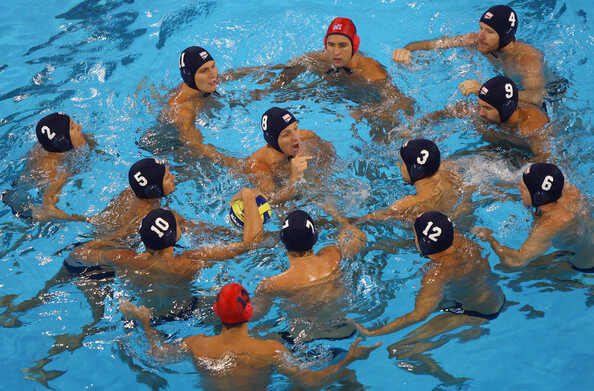
Tony Azevedo with the 2016 U.S. squad. Photo Courtesy: Adam Pretty
I understand what his life was like overseas as he was training in between Olympic games throughout the entire cycle. It’s a lot of work and it was an honor and privilege to be able to play alongside of him. He taught me a lot along the way and was a huge asset for me. But, what’s he’s done, there’s no denying it’s truly, truly amazing. We were all fortunate to be able to be on the same team as him.
– To be a water polo player in the United States is to have a great college career and strive to make an Olympic squad. But after that there are few sustaining opportunities when there’s no Olympics around the corner.
That was kind of how I approached it. A lot of people, they’re like: “Oh my God, the Olympics are great. You’re so lucky. Blah, blah, blah. Are you going to the next one?”
But they forget that an entire person’s life is going into that two weeks. It’s not just … I hate to be blunt about it but unless you do it you’ll never understand.
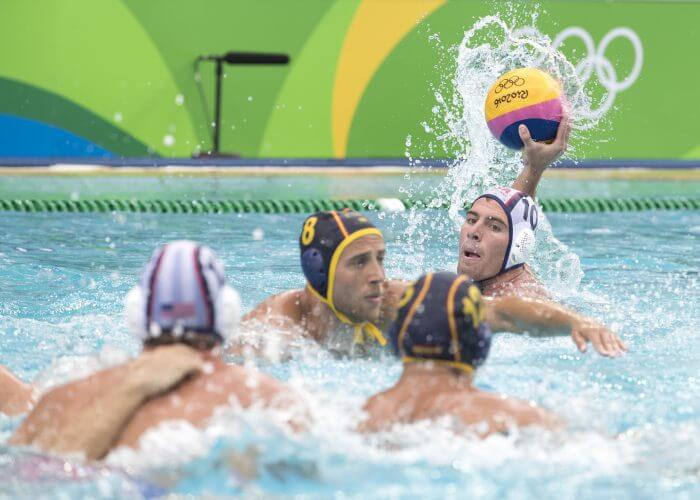
Bonanni shooting. Photo Courtesy: Jeff Cable
You’ll never understand that there’s so much weight on these two weeks. Someone has dedicated an entire four years or a lifetime to get to that point, that it’s so much more than what’s on the surface.
After the Rio Olympics, I was at a crossroads. I could go abroad, play professionally and have another chance at going to the Olympics if I was fortunate enough not to get injured and keep my level of play high enough to maintain my spot on the team.
[But], so many of these other factors and for me it was a great time to also move on and really start laying a foundation in a professional career because, for me, water polo at that time was not sustainable.
Would I have been fine if I would’ve played another Olympics or two? Absolutely. I think I could’ve transitioned and a lot of guys have done it.
But that just wasn’t something that I wanted to do. I wanted to lay my foundation in a professional career as early as possible and really put my Stanford degree to work. I was afraid that if I just continued playing that eventually I would’ve been competing in the professional world, being in real career for lack of a better word, I’d be competing as a 32-year-old with guys that are fresh out of college. I get that an employer thinks it’s interesting that you’ve been in multiple Olympics, but at the same time they can invest in a youth rather than invest in you. Sure, you’re a great person to talk to but this guy, he’s fresh out of school, ready to go. There’s no discounting that you’re a hard worker because you’re an Olympian but it was hard to justify.
There’s no clear black or white answer because it’s more of a feeling than facts, but my feeling was: Let’s just draw the line in the sand, make this leap and go completely all in. If I’m going to work part-time, play part-time then I’m just half in, half out and not really achieving anything in either direction. I’m just buying time.
So, I opted to jump all in to the working world and try to make it happen—and start laying a good foundation. When those next Olympics came around four years later I could honestly look at myself in the mirror and say: You know what? I made some serious strides in my professional career and those four years I made the best out of them.
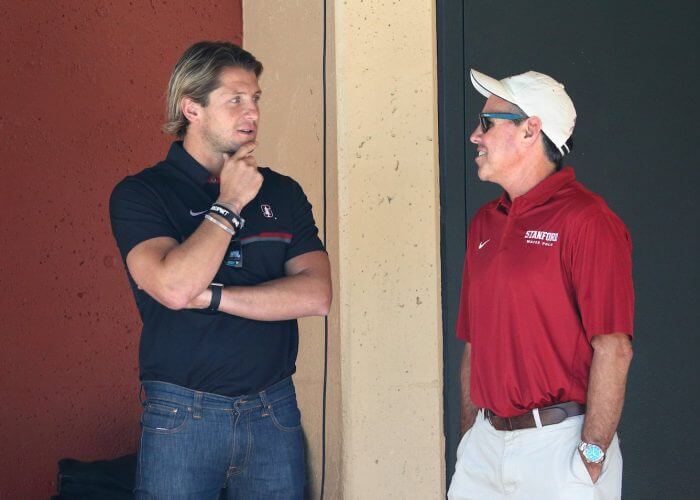
Azevedo and Stanford coach John Vargas
Rather than being half in and half out and kind of having some sort of working experience where my play has gotten a little better…. To me, it wasn’t worth giving up an opportunity for someone else that was coming up through the ranks, to take away their ability to not fill that spot.
If they’re going to give their entire life to something, that was a better … That to me is a better teammate, someone else you’d want to have on your team as opposed to me who’s been working part-time just catching a night practice here and there. That to me was a better move for the team.
– On the USA women’s side, there are nine returning Olympians hoping to go to Tokyo. Why can’t American polo fans expect that their men will do the same?
Obviously, I want nothing but the best for the guys. I hope they do great and for me, that was hands down the hardest part in my whole decision. It wasn’t so much, “Oh, I’m letting the coach down;” it really just came down to: “Damn, I gotta leave these guys hanging and they have to figure out how to fill my position.” Not just from a playing standpoint but you spend so much time that they’re your friends too.
That was without a doubt the hardest [part]. I called each one of them [and] talked them through my decision process. We each had our own conversations, but they were totally receptive. They understood and they quite frankly were super supportive.
Just like I’m supportive of their decision to keep moving on, and they’ll do great things. They’re on the path and hopefully they can have a great run and a great performance not just at the Olympics but the other tournaments leading up to it that no one knows about, like world championships, Super League Final, Pan Ams and all those other tournaments that fly under the radar that don’t get televised, no one knows they exist, no one really is able to tune in, no one’s able to rally behind them as they would, you know, at the Olympic games when a swimmer starts to swim.
Even as an ex-water polo player it’s hard for me to find games to watch. You have live streams that don’t work, you have wrong times posted… Greg Mescall of USA Water Polo is doing the best he can to get the word out there of how to watch these games but at a certain point it’s not on ESPN, it’s not on Fox, it’s not on Sports Center and there’s no way to really keep tabs on the sport unless you really, really, really are hardcore about it.
If you’re not passionate about it in any form whether—as a viewer or a player—you’re just not going to play and you’re not just going to participate. That’s why I think they struggle with getting the numbers. When you’re young, you play your sport with your best friends, you don’t think about it. You get to high school and other interests, but still it’s your main group of guys. You still have other aspects of your life, and as you get older it takes up more and more of your time.
– But without players staying in the sport—which is what Tony did—the chances of a medal for USA diminish.
What he was making—granted it’s Tony—but just the numbers [that] the best players in the world are making right now isn’t the same as what they were at that time, according to Tony.
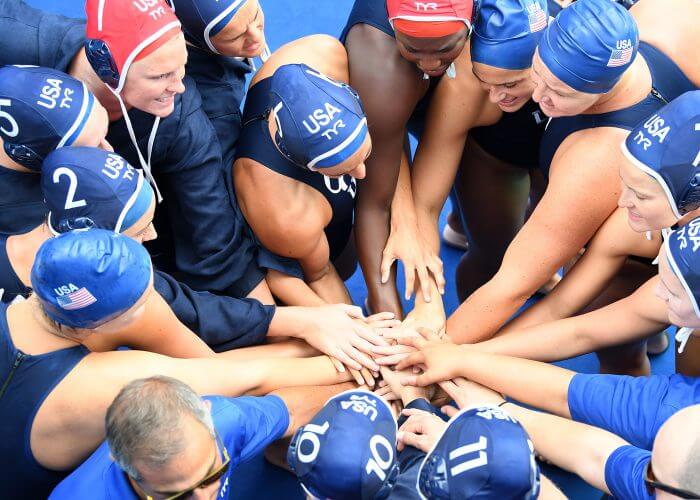
U.S. women’s team Photo Courtesy: FINA
It shouldn’t be all about money, but at the same time, no matter who you are, you worked hard to get yourself into a certain position whether it be in a certain college or a certain level of play and you want to make sure that you maximize your life and how you spend each moment.
If you feel like you’re maximizing your time playing polo then absolutely 100% go all for it. But a lot of people see it as a gateway to a better opportunity. That’s why we’re struggling to see the numbers, because the amount of time you spend and how demanding of a sport it is, it takes up your life.
If you want to be committed, it takes your whole life. If you’re not ready to give your life to it then you’re not going to do it—I think that’s the problem.
– The Olympic ideal of representing your country is great if you’re Michael Phelps or Katie Ledecky. Otherwise, you looking to others to subsidize your dreams.
Absolutely, and it’s hard. It’s hard. Some people have done it but to be honest it’s just not for everyone.
What’s weird is—when I was a kid—doing camps, just starting out, in my early teens playing polo, I thought the guys on the national team… it was just the coolest thing. I would’ve done anything to get on the national team.
For some reason, I don’t see it as much with the kids these days. They just don’t … I’m going to be super candid because I don’t even play anymore but I don’t think it’s cool to be on the national team.
It almost to me seems the best players, they think it’s so cool to just be good and just say, “No, I’m not doing it.” Which is weird to me.
It just is strange, but that’s almost what I’m seeing and I could be wrong but that’s just my personal opinion about it.
I think it’s because it’s a grind and most kids… It’s hard work. From the societal norm is of the payout, there isn’t much payout.
– There’s the ROI [return on investment] thing. You put in so much effort to be good—things you don’t have to do in any other sport, right? You have to think with your head and arms and legs at the same time…
Yeah, then worry about getting punched in the face in the process.
– More importantly, you’ve still got passion for the sport. How does Bret Bonanni continue to give back to the sport?
For me, no doubt that water polo gave me so much—from the friends that I’ve met through playing opportunities, to traveling the world. [That’s] the main reason I do camps—I want to give back and I want to just be an example for kids that are younger, the: “Hey, it is pretty cool to do the national team!”
It is an awesome experience. It may be hard but the best things are sometimes the hardest.
I want to be able to open the door with these kids: “Hey, I’m here to answer any question you have” even if it’s not polo-related. Just being someone to talk to because for kids it’s important that they have someone that’s not their parent, that’s not a teacher, that’s not a coach or directly related to any sort of outcome of theirs, just a neutral person to talk to, whether it be about anything.
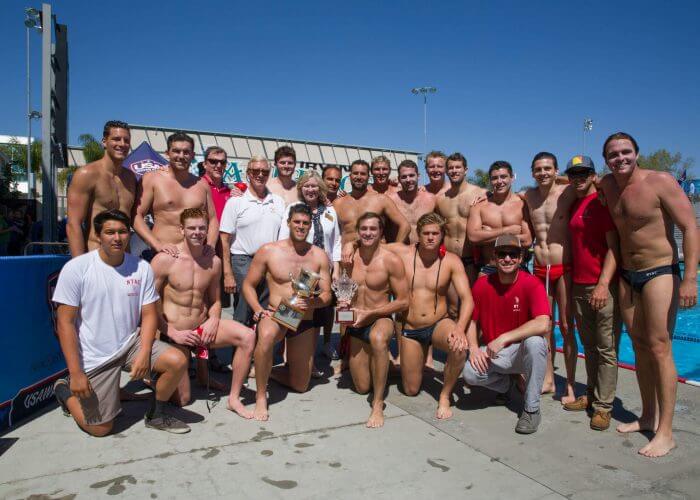
Bonanni (holding trophy on left) with NYAC teammates in 2017. Photo Courtesy: USA Water Polo/Catharyn Hayne
That for me is important and something I hope to be able to continue to do for a while. As far as me physically playing, the sport’s just a good time and I’m fortunate enough to play for NYAC, but it’s no secret that water polo is similar to a language in that when you don’t play often you lose it pretty quick.
Yeah, I still enjoy playing. I like to go see guys that I wouldn’t normally see at these different pools and play a couple tournaments an, try and compete. But for me it’s just all about having fun. Obviously, I want to win every game I play. No one’s in the business of losing. If you have a heartbeat and you don’t want to win, to me that’s just weird. But yeah, it is more so about having fun.
They’re a great group of guys and I’m fortunate to have been asked to play for such a prestigious club and it’s a really cool thing.
I still enjoy the game—I don’t envision myself not playing anytime soon.




great article. someone who is a role model who speaks the truth.